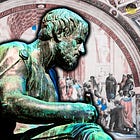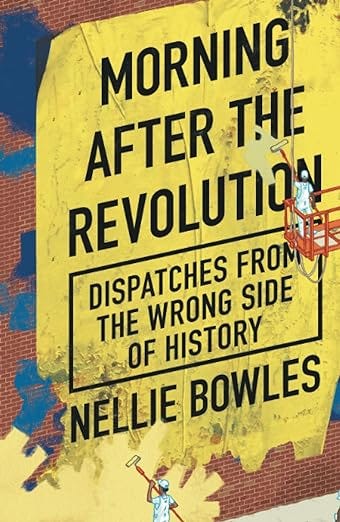The Crisis of Political and Moral Authority in the West
A Review of Nellie Bowles' Book: Morning After the Revolution
Book review by Graeme Kemp: Morning After the Revolution: Dispatches from the wrong side of history’ by Nellie Bowles; (2024); Swift Press; London; 242 pages.
Former New York Times journalist Nellie Bowles is a woman with a mission: to expose the excesses of out-of-control radical political movements. Even politically interested readers of this book may not know just how strange and dangerous many ‘progressive’ or ‘woke’ ideas really are when put into practice. With often few solutions being offered to material problems like the cost of housing or crime, dubious theories and activists have filled the political void, not least in the USA. Nellie Bowles shocking new book exposes just what is happening to American culture. We would do well in the UK to think about her arguments.
The subtext of this book is also clear: there is a crisis of political and moral authority in the West. There is a loss of confidence across our societies in defending reality itself. And there is a loss of nerve among opinion-formers and politicians when it comes to defending genuine progress, or order, in society.
So, what evidence does Nellie Bowles produce?
Even apparently good news today has a negative side according to radical activists in the USA, described by Bowles. Mainstream science and medicine have sadly been tainted by strange, alternative ideas. Bowles notes that…
Progress itself became suspect. Here’s how a top medical journal described a new Alzheimer’s drug: “A landmark Alzheimer’s drug approval would likely deepen racial inequalities in dementia care.” Because: “The emergence of any new drug could really widen healthcare disparities that already exist. (Page xix).
As Bowles explains - there can be prestige and status in embracing such strange, pessimistic positions among radical activists or social elites.
Now, it is possible that such bizarre thinking will cause people just to sigh and shrug their shoulders. The fact is that many of us are increasingly tired of hearing about ‘woke’ excesses. Nellie Bowles does, however, offer some genuinely fresh and shocking accounts of what is going on, particularly in the USA. And (some) of it is quite amusing at times.
So, what else is happening in the USA to shock us?
Well, let’s begin with a question: what type of person is most likely to believe in the following qualities: aiming for perfection; a sense of urgency; a belief in the value of the written word; aiming for comfort; individualism; a belief that there is a right way to do something; and a belief in objectivity?
You might, of course, give a range of answers about the kind of person who thinks the above qualities are good. However, would you automatically assume that they are the qualities of someone who is – white?
Well, the activist Tema Okun does. The above are ‘white’ values, she claims. This would be laughable under normal circumstances, but as Nellie Bowles points out: Tema Okun’s analysis is remarkably influential. Charities, schools, universities, museums and political parties have started to take such ideas on-board. The Smithsonian National Museum of African American History and Culture, as well as the U.S. Democratic Party, were impacted by her thinking.
A high-ranking health official in Oregon noted that it was acceptable to reschedule a meeting of health officials to a later time, as he recognised that urgency is a “white supremacy value” (Page 56) that could get in the way of more intentional, thoughtful work on health issues.
Tema Okun’s ideas – which many would see as frankly insulting to both white and black people – impacted education, too. California redeveloped its entire teaching of Maths around such ideas, in ‘A Pathway to Equitable Math Instruction.’ It took aim at concepts such as objectivity or a singular, right way of doing things. In 2023 California’s new maths curriculum did pass, although as Bowles notes, in a slightly more diluted form.
Tema Okun – the daughter of a well-known left-wing professor – has described her recognition of such ‘white’ values as involving almost a mystical revelation; Nellie Bowles quotes Tema as saying in 2021 that she “…operated mostly as a vessel and the words came through me rather than from me” (Page 61).
Indeed, Tema sees anti-racism as an emotional and spiritual battle, not just a political one. Towards the end of the chapter on Tema, Bowles describes an antiracist meeting Tema was involved in:
A racial equity strategist started the meeting with a poem about separating colors: “We dare white light to pass through a prism and separate light,” the reader said. “We dare the rainbow of colors to weep. (Page 67).
What the above means is anyone’s guess. The above meeting was planned to reveal a range of new characteristics of White Supremacy Culture, including ‘fear’ and the idea of being ‘qualified.’ Bowles notes that a thousand people attended the event.
Unsurprisingly, Robin DiAngelo makes an appearance in the ‘Morning After the Revolution’. In May 2021 she appeared at a course hosted by Carlin Quinn on ‘The Toxic Trends of Whiteness’. Although her star has shone a little less brightly recently, DiAngelo was another major influence in contemporary ‘anti-racism.’ Her ideas are familiar: racism is structural and not individual; white people need to talk about the racism they were socialised into since they were young – and confess their guilt. As expected, things get a little weird on the course; as Nellie Bowles notes..
The course begins with easy questions (names, what we do, what we love). And an ice-breaker question: What are you struggling with or grappling with related to your whiteness? ... People say they feel exhausted constantly trying to fight their white supremacy, that it’s like a current pulling them under. (Page 72).
A white woman called Mia frets that her ‘whiteness’ could harm her bi-racial child. Claire from Los Angeles acknowledges that her existence perpetuates ‘whiteness’ and makes her fearful and ashamed.
It is difficult to imagine anything positive that such so-called ‘antiracism’ courses could achieve. As with Tema Okun, it is the alleged features of ‘whiteness’ that will baffle readers: linear thinking, for instance, is part of the “colonized mindset” (Page 79). Apparently, Indigenous ways of thinking tend to be more cyclical in structure. All very strange and all very unnecessary. It is disturbing to see knowledge racialised in such a way.
Nellie Bowles notes that all such workshops tend to be run by white women – and recruit white women. She wonders if this is because society expects women in general to be more apologetic, including in the field of race. It’s an interesting point.
According to some activists, separating groups on courses by race can be good. This is hinted at in the discussions she describes. The reason? Segregating groups by ethnicity prevents white people observing black people in the discussion process. This mentality seems like a step backwards in time.
Morning After the Revolution extends beyond the madness of Critical Race Theory (CRT) to embrace the excesses of other radical ideas and other events.
This includes the failure of ‘progressives’ to offer solutions to social problems, including those in San Francisco, for instance. This covers the problem of drug use, too. Even here, race gets dragged into disputes in a completely mad way: at Lowell high school, the rigorous entry tests were denounced as racist and scrapped, to be replaced with a lottery system to ensure ‘fairness.’ Indeed, the concept of ‘merit’ itself was dismissed as inherently racist by radicals, claiming it reflected white supremacist thinking. Grades and standardised exams were viewed by activists as unfair barriers to success for students who were not white – or were not Asian. The attack on educational standards is clear.
The Echo Park encampment or community in Los Angeles provides another warning in the book about how ‘progressive’ movements can spiral out of control. A growing number of tents used by the homeless in a city park in 2019 rapidly grew into something larger and more worrying. The camp attracted radical activists - and the police started to withdraw. It was seen as a radical alternative to the wider political, capitalist system.
Far from being a progressive utopia, residents near the park encampment became increasingly afraid for their safety. A dead body was found floating unnoticed in the park lake. Rubbish was just not collected by anyone. When the police eventually cleared the camp, they found tons of waste, as well as needles, firearms, knives and machetes. Utopia had a rough edge to it.
The book also deals with fraught attempts to ‘defund’ the police in certain parts of America – abolishing the police was heralded by some activists as a vital part of the battle against white supremacy. However, such schemes were often rapidly reversed, at a local level, when the consequences of ‘defunding the police became clear: crime increased. The chaos had to end.
Clearly, we live in an age when extreme ideas, usually with a weak evidence base, can take hold. Part of the push-back Bowles seems to be suggesting is that journalists should get more curious and critical when reporting news stories – and see themselves less as activists for political causes. I would strongly agree with that.
Nellie Bowles book, Morning After the Revolution is a lively book with fascinating material. We should heed its warnings; it’s time for a new kind of politics that rejects the strange ideas and failed projects she describes so well.
Graeme Kemp is a former teacher and civil servant who currently lives in the Midlands. He is an English and Cultural Studies graduate of several universities in England and Scotland. He has also contributed book reviews to the Don't Divide Us website and 'Bournbrook' Magazine.
We're excited to announce that Equiano Project Director, Inaya Folarin Iman, is one of the confirmed speakers at the Global Free Speech Summit. The multi-day event will take place this October at Vanderbilt University in Nashville, Tennessee!
More info and tickets HERE.








Another terrifying chapter in the ongoing far left ideological capture of our institutions. It makes me simply want to withdraw from society. I am an old school liberal and I believe I am just as alienated from woke culture as any conservative. I would never live in San Francisco, L.A. or anywhere similar, and I would never sacrifice my children on the pyre of public education. This all makes me want to start a separatist colony somewhere with only common sensers allowed.
These people are not radical and are have nothing to do with the left. They are authoritarian, regressive, racists, who have completely capitulated to the world as it exists. They don’t have the capability or imagination to create new social relations that would create freedom. They only have brow beating and moralism.